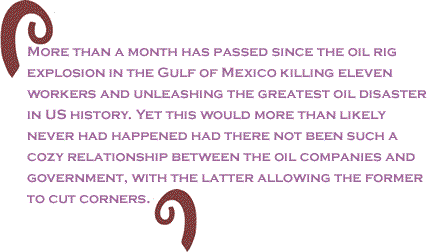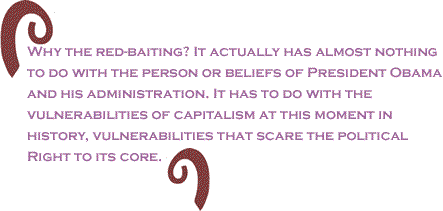We
have found ourselves wondering why President Obama is being
'red-baited' by the political Right. Any reasonable person
looking at the policies of this administration could never
come to the conclusion that it is anything close to socialist
in nature. While there have been certain progressive initiatives
taken by the administration, the pro-corporate orientation
would be evident to a ship in a fog. The hesitancy, for
instance, of this administration to debunk the myths surrounding
the national debt, its willingness to promote off-shore
drilling (prior to the Gulf Coast disaster), the pulling
back from an active and vocal support for the Employee Free
Choice Act, the continuation of wars, the failure to challenge
the Israeli occupation of Palestinian territories, and,
on a different scale, the fact that Larry Summers remains
a close economic advisor to the President show that the
objectives of this administration are as distant from socialism
as Earth is from Alpha Centauri.
So,
despite the rhetoric of Newt Gingrich, why the red-baiting?
It actually has almost nothing to do with the person or
beliefs of President Obama and his administration. It has
to do with the vulnerabilities of capitalism at this moment
in history, vulnerabilities that scare the political Right
to its core. As a result, there is an effort at demonization
by the political Right of any one or any group that suggests
that there may be something very wrong with the current
system, something that must be addressed by a redistribution
of wealth and a real shift in power. For the political Right,
Obama just becomes a convenient target due to his, ironically,
limited efforts at some level of economics redistributionism.
Thus, the Right smears all levels of economic redistribution,
regardless of how milk-toast, as socialism.

Opinion
polls in the spring of 2009, and then just over the last
several weeks, demonstrate a phenomenon that caught many
people flat-footed. A significant percentage of the population
indicated an interest in socialism! While it is unclear
what the respondents meant by socialism, what is clear is
that growing numbers of people in the USA have, at the minimum,
significant questions regarding what some theorists call,
actually existing capitalism.
None of this should actually surprise
us. Consider the following. More than a month has passed
since the oil rig explosion in the Gulf of Mexico killing
eleven workers and unleashing the greatest oil disaster
in US history. Yet this would more than likely never had
happened had there not been such a cozy relationship between
the oil companies and government, with the latter allowing
the former to cut corners.
There is the case of Massey Energy which fought the United
Mine Workers union, as well as fought OSHA rules and fines,
ultimately leading to the deaths of twenty-nine mine workers
due to lack of fresh air and the accumulation of gases and
coal dust. The elimination of regulations plus the ability
of companies to avoid accountability has shown to equal
injury and death for hundreds of workers each year.

We
still have a double-digit unemployment rate, while the political
Right and many cowardly Democrats worry more about the national
debt and deficit, rather than worrying about putting people
back to work. Many of these same right-wing politicians
and pundits remained as quiet as church mice when President
Bush blew up the debt through his invasions of Afghanistan
and Iraq. Now, in the middle of the so-called Great Recession,
these same hypocrites warn of a cumbersome debt for our
grandchildren rather than concerning themselves with workers
who are losing their homes or have to decide between healthcare
and food for their families.
Income
inequality is worse than at any time since the Great Depression.
Internationally, two hundred twenty-five people have more
wealth than the bottom forty-seven percent of the world's
population. In the USA, the top ten percent controls roughly
seventy percent of the country's wealth. This situation
demonstrates a basic lack of fairness, but it has also led
to great instability, particularly as those on the bottom
rings--that is, those who are not rich--fight each other
for the crumbs dropping from the tables of the plutocrats.

And,
if all of that were not bad enough, we find ourselves in
the middle of a global environmental crisis, a crisis that
too many people want to deny, but can be seen all around
us with the disappearance of the North Pole's ice cap being
one very big example. Added to this are bizarre weather
patterns resulting in increases in desertification on the
one hand, and floods on the other.
Millions
of people in the USA are watching this and experiencing
the results. Yet the facts never speak for themselves; people
speak, and people draw conclusions. Without a popular analysis
that is actively promoted, the average person can draw myriad
of conclusions. They can decide that the economic crisis
is the result of this or that ethnic or racial group. They
can decide that it is actually not capitalism that is creating
the environmental crisis but some sort of natural phenomenon,
perhaps a precursor to the so-called "End Times."
Yet
the dramatic economic and environmental changes have opened
the minds of many people to begin to question the status
quo. There needs to be an organized effort to provide just
that analysis, not to mention to suggest a path forward.
One danger that arises is that simply presenting the facts
can lead to dismay and despair, after which people may fall
prey to depression, denial, and demobilization. An analysis
of the criminality and barbarity of capitalism, however,
provides for possibilities for positive action.

Taking
up an analysis critical of capitalism certainly brings with
it risks. This is a country that, since well before the
Cold War, permitted the persecution of progressive and anti-capitalist
activists, labeling them everything but children of God.
Yet the failures of capitalism--rather than the failures
of government--stand for all to see. The story line needs
elaboration in order to tie these failures together in such
a manner that the average person understands that the problem
does not rest with an individual, e.g., Bernie Madoff, or
a particular company, e.g., BP Oil, or a particular administration,
e.g., the Bush OR Obama administrations.
It's
the system... And this is the dark little secret that we
have been taught to avoid recognizing, let alone discussing,
including within otherwise progressive social movements.
The time has certainly arrived to call
things as they are. So whether it is the union movement,
the environmental movement, global justice initiatives or
community-based organizations, we can all see pieces of
ourselves and our existence in the eerie portrait originally
painted by the likes of Adam Smith, but also Henry Ford
and Sam Walton. The point is not to simply recognize ourselves
in this portrait, but to understand the meaning of the entire
painting, in this case, to understand that what ails us
is not a policy, or a mean-spirited individual, but actually
a system on autopilot which, left to its own devices, will
lead us off the cliff.
This article originally appeared in The
Huffington Post.
BlackCommentator.com Editorial Board member, Bill Fletcher,
Jr., is a Senior Scholar with the Institute
for Policy Studies,
the immediate past president of TransAfrica Forum and co-author
of, Solidarity Divided: The Crisis in Organized Labor and a New Path
toward Social Justice (University of California Press), which examines the crisis
of organized labor in the USA. Click here to contact Mr. Fletcher.
Stewart Acuff is the Chief of Staff and
Assistant to the President of the Utility Workers Union
of America. As the AFL-CIO's former Director of Organizing,
Acuff engineered the largest growth union membership in
a generation. He can be reached at [email protected].
|

